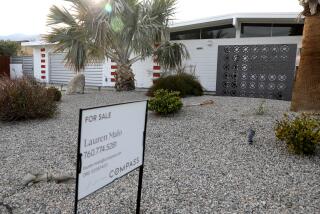Becoming Sold on Online Auctions
- Share via
When it comes to selling new homes on the Internet, builders don’t like to use the word “auction.” Instead, they prefer “competitive online bidding event.”
It’s a semantics trick they hope will help consumers overcome negative connotations associated with home auctions. Historically, most real estate auctions were held for distressed or bankrupt properties. Not anymore.
Today, consumers are choosing to auction their homes on the Internet, prompting real estate brokers to offer auction services and auctioneers to offer real estate services. This, coupled with the fact that builders are planning more online auctions, promises to bring a record number of homes under the virtual gavel in 2001.
Indeed, 43% of online consumers who plan to sell their home in the next two years would be interested in doing so through an online auction service, according to a recent survey by Gomez Inc., a Lincoln, Mass.-based research firm.
“There’s an auction revolution out there quietly happening in the real estate industry,” said Charles Huggins, president of Rbuy.com, a Denver-based auction Web site. Real estate agents help consumers auction their homes on Rbuy.com’s site.
Huggins said the average price of a home listed on his site is $500,000. He added that selling a home through auction is a better way for a seller to obtain a fair-market price for their property.
The increasing popularity of home auctions with consumers and builders is driven in part by the success of online auction sites such as EBay. Sellers are drawn by the immediate payoff, and buyers are interested in auctions for discounts they sometimes offer.
Even so, real estate auctions held both online and in hotel ballrooms across the country still represented only about 6% of the $800 billion in commercial and residential real estate sales in the U.S. in 1998, the most recent year for which figures are available, said Jan Tarnow, manager of commercial real estate at the National Assn. of Realtors.
But the nation’s largest home builders are looking to change that.
IBidCo said it’s working with a number of the nation’s home builders, including Beazer Homes, KB Home, the Ryland Group, Lennar Corp., Toll Brothers, Del Webb Corp., Standard Pacific Homes and William Lyon Homes, to plan online auctions.
The Oakland-based firm designs Web sites for these auctions and provides the technology that runs the events. IBidCo. expects to sell 1,200 homes this year through 60 online auctions.
This is up from just four such events held in the last year, where 80 homes were sold for a total of $30 million, said Chris Albrick, the company’s president and chief executive. Albrick said the technology is best used by builders to sell model homes, for grand openings and to close out a subdivision by getting rid of hard-to-sell lots.
All of IBid’s events to date were held by California builders who wanted to experiment with home auction technology to see if it’s a viable sales tool. In some cases, the promise of an auction was so enticing to consumers that the event itself never happened.
Last month, Beazer Homes’ Northern California division worked with IBidCo to offer 30 homes in a Sacramento subdivision for auction. Consumers who registered for the auction and pre-qualified for a mortgage with Beazer were given a PIN number and a password that they could use to visit Beazer’s home auction Web site.
The event garnered so much attention in Northern California’s tight housing market that consumers took advantage of an option on the Web site that allowed them to buy a home before the auction by paying a 15% premium on the home’s starting price.
All 30 homes offered by Beazer were purchased this way, causing the company to cancel the auction and, nonetheless, to declare the experiment a success.
“The thing we learned the most is that people will purchase even this large ticket item online,” said Judy Schroeder, marketing manager for Beazer’s Northern California division.
Fremont resident Loretta Rehberg, who bought two of Beazer’s homes online for $205,000 each, said she liked the convenience of choosing online the lots where the homes will stand.
But she didn’t buy them sight unseen. She visited model homes in another Beazer subdivision to get an idea of what the three-bedroom, two-bath homes looked like. And she liked them so much that she wasn’t willing to wait for the auction.
“I was thinking that if I waited until the auction, there wouldn’t be any left,” said Rehberg, who took advantage of Beazer’s offer to buy the properties early at a premium over the starting price. (This price was the homes’ market value, Schroeder said.)
In hot markets, online auctions can drive the price of a home over its market value.
People outbidding each other in an event held last year by Taylor Woodrow Homes for 17 high-end model homes in Orange County’s Ladera Ranch and the Woodlands in Valencia drove prices higher than the builder would have sought on the open market, said Barbara Stowers, the company’s vice president of sales and marketing.
But events such as these have led consumer groups to caution that home buyers and sellers are exposing themselves to some risk when they make what in most instances is the biggest purchase or sale of their lives online.
Indeed, almost half of the Internet-related complaints received by the Federal Trade Commission last year concerned online auctions-albeit for events related to small items such as Beanie Baby fraud.
Buyers and sellers should make sure they thoroughly research the other party before initiating a deal, FTC attorney Delores Gardner said. Buyers should have the home appraised and inspected, and sellers should make sure buyers are serious, she added.
And some online real estate ventures still aren’t sold on online auctions.
Richmond, Calif.-based online broker ZipRealty.com has a deal to post its home listings on EBay’s real estate site, at https://www.ebay.com/realestate.
Buyers can’t bid on these listings online. Instead, the deal is meant to bring buyers and sellers together, who will then work with a ZipRealty agent to close the deal.
ZipRealty President Scott Kucirek said it’s too early to say whether the firm’s listings will eventually be available for auction on EBay. It’s still difficult to gauge how many consumers would be interested in such a service, he said.
Even if online auctions never gain a mainstream following, chances are they will always appeal to investors who purchase foreclosures-historically the meat and potatoes of the auction industry.
Some auction sites, such as https://www.homesdirect.com and https://www.amsauctions.com, cater to this market by primarily offering repossessions.
Gadsden, Ala.-based AMSauctions.com has used its Web site to reach a greater number of investors nationwide who are looking for properties priced at 50% to 85% of their market value, said Tony Isbell, the company’s president. The company has sold about 600 homes on its site since it went live in June.
Investors are able to review properties on the site for a few weeks before they’re offered for sale and aren’t rushed as they are when they attend a traditional auction, Isbell added.
Even though online auctions have proven themselves to be a good advertising tool, builders say they need further testing to determine their true appeal to consumers.
“There hasn’t been enough proving out of the circumstances in which it’s beneficial to both sides,” said Glen Barnard, president of E.KB Inc., KB Homes’ e-commerce division. “I think six months from now we’ll reach some definitive answers.”
*
For previous columns see www. latimes.com/virtual.
More to Read
Inside the business of entertainment
The Wide Shot brings you news, analysis and insights on everything from streaming wars to production — and what it all means for the future.
You may occasionally receive promotional content from the Los Angeles Times.










